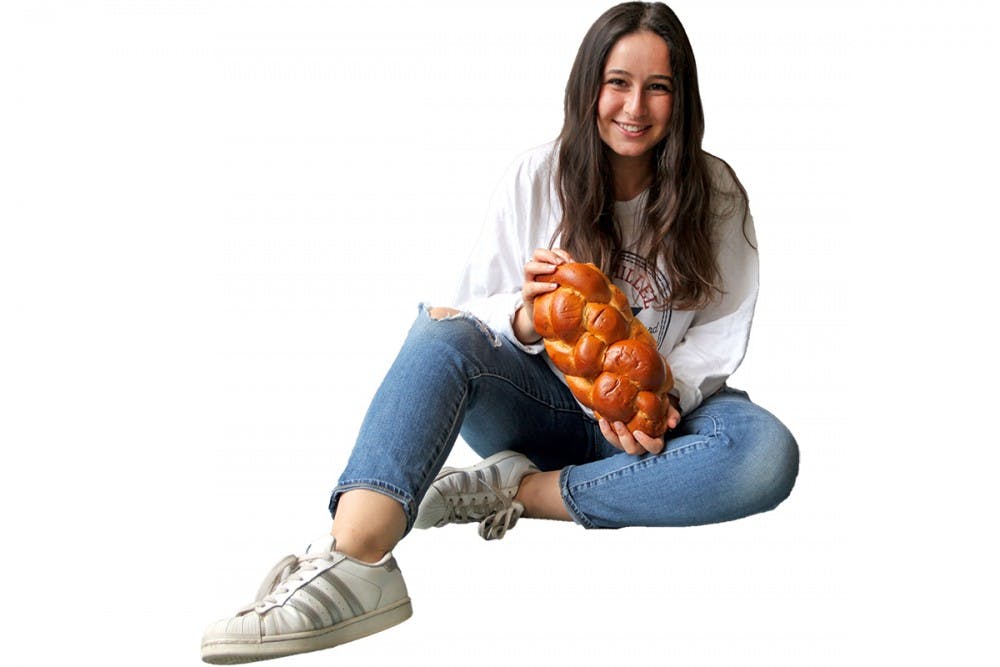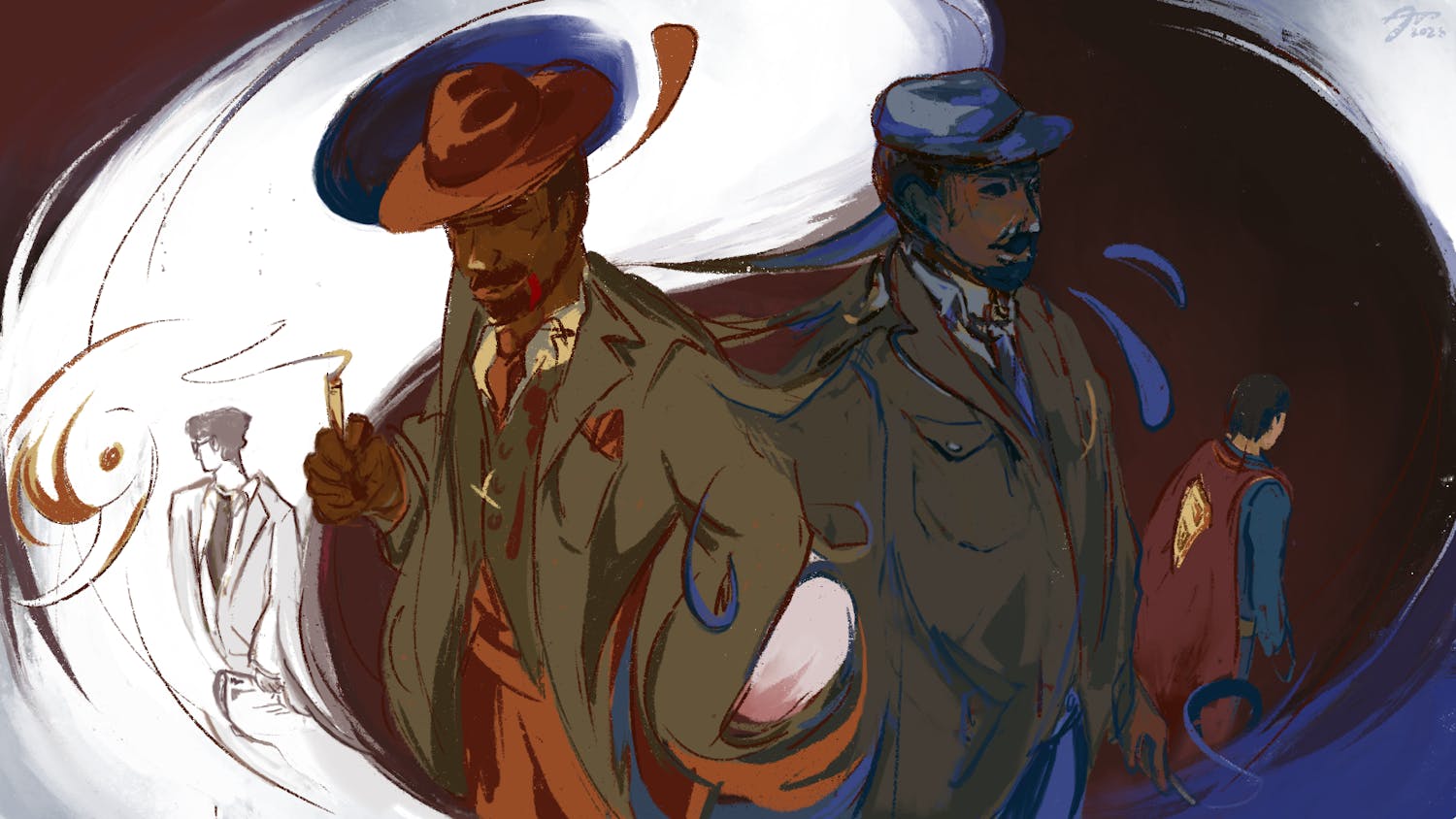Hometown: Westport, Connecticut
Major: Computer Science & Psychology
Activities: Hillel, Meor, TA for Stat 511 & Cis 573
Freshman Dorm Room: Hill 4th Floor Yellow, Room 440
Forget everything you thought you knew about the religious Jewish community at Penn, because this week’s Ego is Maddie Gelfand, Hillel president and expert challah baker. Her popular Instagram page, @aintnochallahbackgirl_, loaded with stills of her sprinkle-dusted creations, couldn’t be a more accurate representation of her in-person demeanor. It’s easy to understand why Maddie is always so cheerful – after years of looking for her place at Penn, Maddie Gelfand is committed to spending her senior year focusing on the real passions she’s found both in and out of the classroom.
Street: Before we even talk about Hillel - you just told me that you added a second major, Psychology, just this week! How did you end up making that kind of decision as a senior?
Maddie Gelfand: Well, I came in as a systems engineering major, and I didn’t like it one bit. But I did like CIS 110, so, in my second semester I switched to CompSci. But then I hated that too.
By the end of my sophomore year, I was like, “Wow, this sucks - I don’t like this!” When people ask me what my major is, I say, “typing.” Computer science is just not for me, and I didn’t want to sit and type at a computer for the rest of my life. But I did really like intro psych when I took it sophomore spring. At that point, I couldn’t switch out of engineering, so I just just kept taking psych classes instead, and eventually decided to add the major. I feel like I’ve gone through a lot of different worlds at Penn. I started out really into being a woman in computer science, then I was in a sorority for a bit, and now I’m more religious and really involved at Hillel. And I’m a psychology major!
Street: So you didn’t get involved in Hillel right away when you got to Penn?
MG: No! When I got to Penn, I was afraid of Hillel because I walked in for the first Shabbat and it was overwhelming and just…it was a lot. I wasn’t religious at all, and I didn’t really do anything Jewish. So I just didn’t go back for a while. But I kept getting asked to go on coffee dates by people who work there, and eventually I just gave in and met up with Lauren Epstein. After we met, she suggested, kind of out of the blue, that I apply for Hillel social chair. So, I applied on a whim, ended up getting it, and the rest is history.
Street: Why apply, if you were scared of Hillel?
MG: Well, I wasn’t necessarily scared so much as I was just really intimidated. I didn’t feel like it was going to be my thing that I did in college. But a lot of my friends from Comp Sci classes were always around there, and I liked going to services on Friday night.
Mainly, though, I was just way too eager. Someone was like, “Wanna apply for a board position?” and I was like, “YEA.” I did a lot of other activities on campus as well, I was a part of like 6 or 7 groups, and once I became Hillel president, I knew I just wouldn’t be able to stay on top of all of them. It’s like having a full-time job.
Street: What does that job consist of?
MG: My official duties are in convening all of the leaders at Hillel for weekly conversations about what’s going on, how we can move forward, big ideas… stuff like that. I meet with the heads of all the religious communities (which are the Orthodox, Reform, Conservative, Egalitarian, Shira Chadasha, and Sephardic Yidden Quakers groups), some of the social communities, like J-Bagel (the LGBTQ+ group in Hillel), and the leader of the Israel sector. We actually have a ton of Israel-oriented groups that fall everywhere on the political and social spectrums. I also sit on the board of overseers with a bunch of old, adult Jewish people.
But the majority of my job is not the part that’s defined. It’s really the time I spend acting on things that I care about. I spend all of my time planning events that I think would be good, talking to people about their ideas and goals, helping them do what they want to do, meeting new people, and attending, like, a LOT of Hillel events every week. It’s a lot of that kind of stuff. And if I see something that I don’t like, I’ll spend all of my time trying to fix it.
Street: Is there anything major that you’ve been trying or fix since you became president?
MG: The thing I’ve been trying to tackle is figuring out how to make everyone – people who are Jewish, people who aren’t Jewish, everyone – feel comfortable at Hillel. I really feel like it’s my home away from my apartment on campus. And there’s no reason that I should feel that more than you or more than anyone.
So it’s my goal to do whatever I can to make everyone feel as comfortable as I feel. We’re doing a lot of different things – and most of them are small – to try and appeal to everyone. One thing we did was add a free food table! There’s just a place for all that extra food from meetings and stuff to go, right on the second floor outside all of the meeting rooms. It’s a small win. I just want people to see Hillel like any other cultural center on campus. Some people are going to identify with the dominant culture and religion, but it can still be a space for everyone.
Street: Do you work with other cultural centers on campus?
MG: Yea! Hillel is a part of PRISM, which is an interfaith cohort of all the religious groups on campus. And I also sit on the UA Steering committee, which is all of the leaders of umbrella groups on campus.
Street: What do you want people to know about Judaism at Penn, given that we have so many Jewish students here?
MG: I wouldn’t equate Hillel to Judaism at Penn. I think most people know that. But I think being Jewish at Penn and being part of a Jewish community at Penn can look like a lot of different things. It isn’t one homogeneous community. Hillel’s role is just to help people be Jewish in whatever way they want to be Jewish. If that means you want help throwing together an awesome Shabbat dinner, you do you. If that means you want to go to services, do that. And if that means you want to throw a New Year’s Party for Rosh Hashanah, I’m doing that next week!
We have all these fancy stats that say “Hillel reaches 90% of Jews on Penn’s campus”. I don’t know what that means, but I see what’s going on in Hillel. And Hillel is great and wonderful, but I would always love to see more people, and different people.
Street: Have there been any major obstacles during your presidency?
MG: Yea, actually. I was elected the same night Trump was elected.
Street: Street: Oof. Tell me about that.
MG: It was crazy!! I was in a 5–8 class, Abnormal Psychology. I was on my computer, pretending to take notes, but really trying to stay updated. And when I got notified that I won during class, I was freaking out, I was just really, really excited. I walked into Hillel after class and it was crazy. So many people were there, and everyone was congratulating me.
And then like an hour later that night, I made my way down to where people were watching the election. It was…intense. And tense. There were a lot of opinions and projections going around, and we were watching that little prediction meter slide slowly towards Trump. It was just so upsetting.
When I woke up the next morning, I had, like, 15 emails all telling me that I needed to send an email out to the community about the election, and that office hours were going to be held in Hillel and we needed to make sure that everyone knew they were welcome, no matter their political opinion. It was a rainy day, and everyone was so sad and shocked. And that was the very first thing I did as president.
Street: How did you write that?
MG: There was a lot of editing. I sat down with my vice president, and we just tried really hard to say what needed to be said. Hillel staff was also helping us do it, because we were just totally still fresh.
I thought that would be the craziest and hardest email to write, but to be honest with you, the one that I wrote two weeks ago was worse.
Street: What’s it like to be in charge of a massive cultural organization under the Trump presidency? Has that changed the way you approach interfaith and intercultural interactions?
MG: I don’t know if it’s changed the way that I approach those things, but it’s created a need for them to happen more often. We should be collaborating with the Muslim Students Association way more. We should all be supporting each other with everything no matter what. It shouldn’t have to get to a critical level. But I think the greatest part of being elected into this and having the opportunity to be the face of a huge organization on campus has been to be able to speak at these gatherings with all the faith leaders, and to be able to talk to administration about things regarding policy, and campus, and things like that. That opportunity is really amazing. That’s real.
It’s fun to throw together a drinks event, and it’s fun to plan a Hillel formal, or a Purim thing, or a Hanukkah party. But it’s meaningful to be able to do all those less flashy things.
Street: Last question: What’s the best challah you’ve ever made?
MG: The best one I make is cinnamon sugar. That’s always the go-to. My favorite one to make, though, is honey whole wheat – it’s just really hard because whole wheat flour is hard to work with.
But I always add sprinkles, because color is fun, and life is about adding sprinkles.
Lightning Round
There are two types of people at Penn… Those who know to prepare for this question, and those who don’t.
The first thing I do when I wake up in the morning is… Snooze. I know if “you snooze you lose,” so I guess I lose.
The last thing I do before I go to bed at night is… Have Siri tell me about the weather the next morning so I can decide what to wear. Sometimes I end up wearing something like rain boots when it’s definitely not raining, but that’s Siri’s fault, not mine!
The best thing to eat at Hillel is… a chicken wrap with lettuce, tomato, caramelized onions, guacamole, and Sriracha aioli.
My favorite bathroom to poop in on campus is… DRL third floor, hands down.







